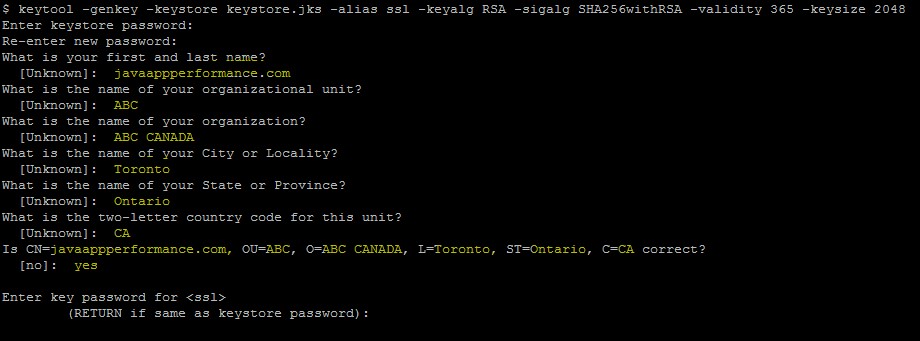Java Rsa Key Generation Example
RSA example with random key generation. RSA example with PKCS #1 Padding. RSA example with OAEP Padding and random key generation. An example of using RSA to encrypt a single asymmetric key. Simple Digital Signature Example: 36.38.7. Creates a 1024 bit RSA key pair and stores it to the filesystem as two files. Example of RSA generation, sign, verify, encryption, decryption and keystores in Java - RsaExample.java.
The following are top voted examples for showing how to use java.security.KeyPairGenerator.These examples are extracted from open source projects. You can vote up the examples you like and your votes will be used in our system to generate more good examples. Apr 23, 2012 Generating a RSA Key with the Java Keytool. Use the Java keytool to create public and private keys for RSA authentication if the client is in Java. RSA authentication uses public and private keys instead of passwords to authenticate with the ESP Server. This chapter demonstrates how to generate an RSA based OpenPGP key pair with OpenPGP Library for Java. When we create an OpenPGP key pair, a few parameters must be passed. These include: Encryption key size in bytes (recommended between 1024 and 3072) User ID key algorithm (RSA or ELGAMAL) private key password list of preferred.
How can I generate RSA key pair in Java using the format supported by OpenSSL? Is there a way to generate them straight away like how we do in php? The output should be like: -BEGIN PU. The Java KeyPairGenerator class (java.security.KeyPairGenerator) is used to generate asymmetric encryption / decryption key pairs.An asymmetric key pair consists of two keys. The first key is typically used to encrypt data. The second key which is used to decrypt data encrypted with the first key.


| importjavax.crypto.Cipher; |
| importjava.io.InputStream; |
| importjava.security.*; |
| importjava.util.Base64; |
| import staticjava.nio.charset.StandardCharsets.UTF_8; |
| publicclassRsaExample { |
| publicstaticKeyPairgenerateKeyPair() throwsException { |
| KeyPairGenerator generator =KeyPairGenerator.getInstance('RSA'); |
| generator.initialize(2048, newSecureRandom()); |
| KeyPair pair = generator.generateKeyPair(); |
| return pair; |
| } |
| publicstaticKeyPairgetKeyPairFromKeyStore() throwsException { |
| //Generated with: |
| // keytool -genkeypair -alias mykey -storepass s3cr3t -keypass s3cr3t -keyalg RSA -keystore keystore.jks |
| InputStream ins =RsaExample.class.getResourceAsStream('/keystore.jks'); |
| KeyStore keyStore =KeyStore.getInstance('JCEKS'); |
| keyStore.load(ins, 's3cr3t'.toCharArray()); //Keystore password |
| KeyStore.PasswordProtection keyPassword =//Key password |
| newKeyStore.PasswordProtection('s3cr3t'.toCharArray()); |
| KeyStore.PrivateKeyEntry privateKeyEntry = (KeyStore.PrivateKeyEntry) keyStore.getEntry('mykey', keyPassword); |
| java.security.cert.Certificate cert = keyStore.getCertificate('mykey'); |
| PublicKey publicKey = cert.getPublicKey(); |
| PrivateKey privateKey = privateKeyEntry.getPrivateKey(); |
| returnnewKeyPair(publicKey, privateKey); |
| } |
| publicstaticStringencrypt(StringplainText, PublicKeypublicKey) throwsException { |
| Cipher encryptCipher =Cipher.getInstance('RSA'); |
| encryptCipher.init(Cipher.ENCRYPT_MODE, publicKey); |
| byte[] cipherText = encryptCipher.doFinal(plainText.getBytes(UTF_8)); |
| returnBase64.getEncoder().encodeToString(cipherText); |
| } |
| publicstaticStringdecrypt(StringcipherText, PrivateKeyprivateKey) throwsException { |
| byte[] bytes =Base64.getDecoder().decode(cipherText); |
| Cipher decriptCipher =Cipher.getInstance('RSA'); |
| decriptCipher.init(Cipher.DECRYPT_MODE, privateKey); |
| returnnewString(decriptCipher.doFinal(bytes), UTF_8); |
| } |
| publicstaticStringsign(StringplainText, PrivateKeyprivateKey) throwsException { |
| Signature privateSignature =Signature.getInstance('SHA256withRSA'); |
| privateSignature.initSign(privateKey); |
| privateSignature.update(plainText.getBytes(UTF_8)); |
| byte[] signature = privateSignature.sign(); |
| returnBase64.getEncoder().encodeToString(signature); |
| } |
| publicstaticbooleanverify(StringplainText, Stringsignature, PublicKeypublicKey) throwsException { |
| Signature publicSignature =Signature.getInstance('SHA256withRSA'); |
| publicSignature.initVerify(publicKey); |
| publicSignature.update(plainText.getBytes(UTF_8)); |
| byte[] signatureBytes =Base64.getDecoder().decode(signature); |
| return publicSignature.verify(signatureBytes); |
| } |
| publicstaticvoidmain(String.. argv) throwsException { |
| //First generate a public/private key pair |
| KeyPair pair = generateKeyPair(); |
| //KeyPair pair = getKeyPairFromKeyStore(); |
| //Our secret message |
| String message ='the answer to life the universe and everything'; |
| //Encrypt the message |
| String cipherText = encrypt(message, pair.getPublic()); |
| //Now decrypt it |
| String decipheredMessage = decrypt(cipherText, pair.getPrivate()); |
| System.out.println(decipheredMessage); |
| //Let's sign our message |
| String signature = sign('foobar', pair.getPrivate()); |
| //Let's check the signature |
| boolean isCorrect = verify('foobar', signature, pair.getPublic()); |
| System.out.println('Signature correct: '+ isCorrect); |
| } |
| } |
commented Oct 17, 2019
It's good thank you so much , How can i create base64 like jwt (header,body,sign) ? |
commented Nov 26, 2019
Thanks for the code. One issue - using |
commented Dec 29, 2019
@stdunbar: It depends on your keyStore creation. |
The Java KeyPairGenerator class (java.security.KeyPairGenerator) is used to generate asymmetric encryption / decryption key pairs. An asymmetric key pair consists of two keys. /generate-a-random-key-in-php.html. The first key is typically used to encrypt data. The second key which is used to decrypt data encrypted with the first key.
Public Key, Private Key Type Key Pairs
The most commonly known type of asymmetric key pair is the public key, private key type of key pair. Open source license key generator. The private key is used to encrypt data, and the public key can be used to decrypt the data again. Actually, you could also encrypt data using the public key and decrypt it using the private key.
The private key is normally kept secret, and the public key can be made publicly available. Thus, if Jack encrypts some data with his private key, everyone in possession of Jack's public key can decrypt it.
Creating a KeyPairGenerator Instance
To use the Java KeyPairGenerator you must first create a KeyPairGenerator instance. Creating a KeyPairGenerator instance is done by calling the method getInstance() method. Here is an example of creating a Java KeyPairGenerator instance:
Java Rsa Key Generation Example Pdf
The getInstance() method takes the name of the encryption algorithm to generate the key pair for. In this example we use the name RSA.
Initializing the KeyPairGenerator
Depending on the algorithm the key pair is generated for, you may have to initialize the KeyPairGenerator instance. Initializing the KeyPairGenerator is done by calling its initialize() method. Here is an example of initializing a Java KeyPairGenerator instance:
This example initializes the KeyPairGenerator to generate keys of 2048 bits in size.
Generating a Key Pair
To generate a KeyPair with a KeyPairGenerator you call the generateKeyPair() method. Here is an example of generating a KeyPair with the KeyPairGenerator: